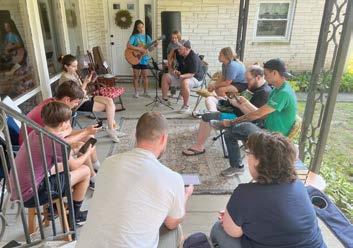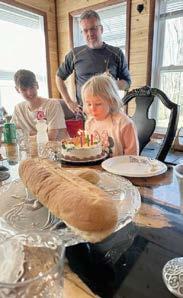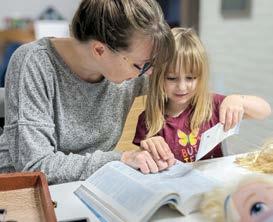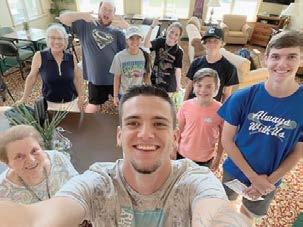
9 minute read
Asking (and Answering) the Right Questions
by Pastor David Robinson
Renovating an old house is way easier than building a new one” … said no contractor ever. Taking an existing building that was built with a particular purpose, style, and taste, and changing it into something based upon a different purpose, style, and taste is not an easy venture. Issues like the quality of past workmanship, age, and condition of the existing structure, damage, location and, of course, cost are all things that ought to be weighed when considering renovating a building. Usually, complete renovation costs more – more time (destruction comes before construction), more money (who knows what you are going to find once you start ripping things apart), and usually more headaches (see prior parentheticals).
As you may have surmised, this article is not about houses at all, at least not in the literal sense. Rather, it is about the story of one church’s continuing journey for relevancy – striving to answer the questions:
Who are we?
Why do we exist as a church?
Are we truly impacting the lives of those in our fellowship and community?
Are we doing this church thing “the right way”?
This is no easy list of questions, especially if you really are looking for answers. In seeking answers to these questions, we have had to continually answer two more difficult questions throughout the process:
What are we willing to let go of and what are we willing to cling to as we become the church Jesus is calling us to be?
This article is about the insights I have discovered while helping lead the Elizabethtown Church of God’s transformational journey from a body of believers who followed a “traditional” American way of “doing church” to a more “traditional” first century Ancient Near Eastern way of being the church through Church Houses.
A brief warning before you read any more of this article: 1. This is an extremely condensed summary of our church’s journey because of space constraints. 2. This was not a linear journey with clear answers and total unanimity among the people who comprise the church. 3. This was and continues to be a process where discovering purpose among equals is as valuable as the “final product.” 4. The views I have expressed are my synopsis of our church’s unfolding story that took the giftings and talents of many people, not least of which was a dynamic and wise church council. 5. This is the answer for our church, not necessarily your church… but it may be!
The Elizabethtown Church of God has been in decline for decades. Attendance was down, giving was down… any metric that churches usually care about were consistently down. I remember the laments, “What used to work back in the good old days does not work now,” and “Something has to be done differently, because what we are doing is not working!” as appropriate summaries of what many people were thinking and feeling. The problem was no one knew what that “something” was.
Over a period of three years and with the help of a myriad of people, resources, influences, and the Holy Spirit, God led us to that “something” – Church Houses, also known as house churches or micro-churches. Rather than focus on the “how,” I will focus on the “what” and “why” by providing answers to the questions posed above.
Answering the Questions:
Who are we?
We knew what the Bible taught about who the Church is – the Body of Christ (1 Corinthians 12:12), the light of the world (Matthew 5:14), the redeemed people of God (1 Peter 1:18), and members of God’s family (Ephesians 2:19) to name a few, but who were we, the Elizabethtown Church of God? How did we incarnate these biblical teachings in our community? In our families? In our fellowship?
Whereas many of us could answer these questions with the correct biblical answer, we all knew that something was missing. Had we become that church that is content with our own circle? That church that has a weekly “service” where people sit, sing songs, usher the kids off to a program, and listen to someone talk at them because that’s how “church is done”? Was church – despite our head knowledge of the contrary – simply a service that we were laboring to attract others to through various “outreach” efforts so we can get the “lost saved” while helping to balance our budget? Is that who we were? Is that who we wanted to be? Is that what God wanted us to be?
As you can see, the more you seek answers, the more questions arise – and harder questions at that!
Why do we exist as a church?
Hmmmm. A “correct” answer is… To represent Jesus to all through our words and deeds and to complete the Great Commission (Matthew 28:19) by expanding God’s Kingdom. Now, why did we exist? Again, while many could give a great biblical answer, I’m not sure how many really knew what the answer was. Did we exist to sustain a building? To hand out food to the hungry? Offer programs to children? Pay the pastor and staff? (Again, more questions!) While none of these things are wrong in and of themselves, they become so if they are the reason(s) why our church existed.
Are we truly impacting the lives of those in our fellowship and community?
With regards to those who attend our church, aside from the usual church things like Bible studies, Sunday school, and everything that is involved in putting together a Sunday service, there were not frequent or consistent happenings that truly grabbed you by the shoulders and demanded a life change. (I can think of a few, but I am talking about a sustained impact). Yes, biblical lessons and stories were taught and learned. Friendships were made and maintained. But at what level? At what depth? What change was taking place? I would say a minimal amount.
In terms of community impact, for a small church, we fared better here due to a thriving food pantry that not only has helped people with physical needs but acted as a catalyst for others in the community to come to know Jesus by getting to know us. Several benefactors of the pantry’s ministry would consider Etown “their church” and more than a few have become part of our Church Houses. But how were we impacting the community in other ways—ways where people didn’t have to come to us, but rather we went to them? (Again, with more questions!)
Are we “doing” this church thing “the right way”?
This is a faulty question. It assumes that someone “does church” and that there is a " right way” of doing it. One does not “do church,” rather one is part of the church. Church is about identity first, actions second. Of course, actions and deeds are a crucial part of the Church and one’s life—but these actions flow from who we are, they are a result of our identity in Christ. More pertinent to this topic though, is how we organize together as a body, how we structure ourselves as a local congregation, how we gather corporately to worship, how we truly make a lasting impact with those within our congregation and those within our community. The more we looked at these issues, the more we realized the answer to the above question was, “No.”
Which leads to the final gut-wrenching questions to answer: What are we willing to let go of and what are we willing to cling to as we become the church Jesus is calling us to be?
Let’s break that down into three questions:
What kind of church was Jesus asking us to become? What was essential in making that a reality? What were we willing to do about it?

What kind of church was Jesus asking us to become?
Church Leadership discerned that we were called to be a church that valued intentional community, growth, and service. We wanted to truly live and learn the Gospel among a group of Christians that would journey through life together and help each other mature in our faith. We desired to take the priesthood of all believers seriously and not rely solely on clergy to “do ministry.” We needed to impact our community in more personal and meaningful ways.
In order to do this, we decided to hold on to the following: The priesthood of all believers mentality, more meaningful and intentional relationships through small groups we call Church Houses, discussion-based learning, relational evangelism, and intentional leadership development.
We decided to let go of the following: Clergy-centric ministry, church “services,” a centralized church building, and a “come to us” ministry ethos.
There is much more to this story than what I have written here. We are by no means a “finished product.” Our renovation is on-going and worth all of the time, effort, and energy as we continue to learn the “best ways” of expressing our faith, living it out, and sharing it with others. The Elizabethtown Church of God is now in the capable hands of Pastor Andy Wiedemann and his team of co-leaders, as they continue to build, tweak, and improve our newly renovated church. Whereas I am no longer the pastor of this church, I resigned in December of 2023 after accomplishing what I was called to do here as Pastor, I am still active in the church as a House Leader with my wife Nicole.
In closing, some advice for those who see and feel the need for change in your local church… there is no pattern or model, by itself, that you can copy that is going to fix your problems. The long and hard process of seeking God, being patient, having genuine relationships with your leadership team, and figuring things out one step at a time is vital. The hard work and process done within the context of genuine loving relationships is the key (1 Peter 4:8).
For more information on The Elizabethtown Church of God’s ministry and Church Houses, Visit: www.etownfirst.org.

David Robinson has been married to his wife, Nicole, for over 26 years and is a father to three awesome children, Caden, Ellianna, and Christian. While he has been “in full-time ministry” for over 23 years, the last seven of which were pastoring at the Elizabethtown Church of God, he is now taking a respite and drives professionally for Amazon. He loves spending time with his family, his dogs, outdoors, movies, and marital arts and can't wait to see what God has in store for him next.


